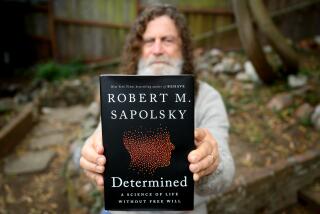Letters: Free will and the brain
- Share via
Re “Head case puzzle,” Opinion, July 15
Robert M. Sapolsky highlights the paradox between biological causes of abnormal behavior and the issue of assessing moral and legal responsibility.
After 40-plus years in psychiatry, I have found that the most useful pathway is to accept the paradox, following John Stuart Mill’s advice: While ultimately our will is not free, for the sake of an orderly society, it is necessary to act as if it were.
Pragmatically, I interpret this to mean that when the biological causation is extraordinary (major brain damage or an acute cerebral infection), the person would be considered less accountable. But for those who blend in with normal society (who, like Jerry Sandusky, are able to work, marry and more), any subtle brain abnormalities that may have increased the likelihood of their antisocial behavior cannot be grounds for them to escape responsibility.
Cyril Barnert, MD
Los Angeles
Sapolsky demonstrates why free will does not exist, and then states that he wouldn’t touch that issue with a 10-foot pole.
The concept of free will provides a way for normal people to excuse the harsh punishment of those whose behavior does not conform to the laws that define what most of us consider normal behavior. I am fortunate to have qualities that allowed me to conform to our laws, but I recognize that I did not choose to have those qualities.
Society, myself included, demands to be protected from harmful individuals; unfortunately for them, villainizing those people provides a powerful incentive to conform to our laws. Sadly, villainizing them also inhibits developing a true understanding of their behavior.
Laurent McReynolds
La Crescenta
ALSO:
Letters: The Boy Scouts’ ban on gay kids
Letters: Washington’s debt is our problem
Letters: California’s electricity, Wall Street’s game
More to Read
A cure for the common opinion
Get thought-provoking perspectives with our weekly newsletter.
You may occasionally receive promotional content from the Los Angeles Times.






